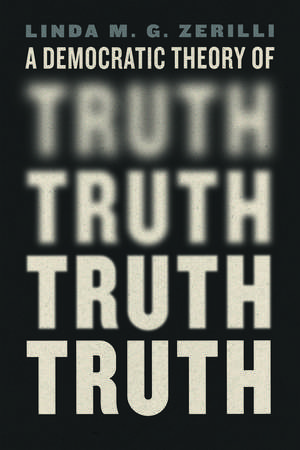A Democratic Theory of Truth
Autor Linda M. G. Zerillien Limba Engleză Paperback – 25 apr 2025
We say that we live in a “post-truth” era because disinformation threatens our confidence in the existence of a shared public world. Affirming objective truth may, therefore, seem necessary to save democracy. According to political theorist Linda M. G. Zerilli, such affirmation can stifle political debate and silence dissent. In fact, Zerilli argues that the unqualified insistence on objective truth is as dangerous for democracy as denying it.
Drawing on Arendt, Foucault, and Wittgenstein, A Democratic Theory of Truth challenges the concept of truth presupposed by the post-truth debate. It argues that we, the people, have an essential role in discovering and evaluating any truth relevant to the political realm. The result is a striking defense of plurality, dissent, and opinion in contemporary democratic societies.
Preț: 184.18 lei
Nou
Puncte Express: 276
Preț estimativ în valută:
35.24€ • 36.80$ • 29.10£
35.24€ • 36.80$ • 29.10£
Carte nepublicată încă
Doresc să fiu notificat când acest titlu va fi disponibil:
Se trimite...
Preluare comenzi: 021 569.72.76
Specificații
ISBN-13: 9780226839042
ISBN-10: 0226839044
Pagini: 272
Dimensiuni: 152 x 229 x 28 mm
Greutate: 0.31 kg
Ediția:First Edition
Editura: University of Chicago Press
Colecția University of Chicago Press
ISBN-10: 0226839044
Pagini: 272
Dimensiuni: 152 x 229 x 28 mm
Greutate: 0.31 kg
Ediția:First Edition
Editura: University of Chicago Press
Colecția University of Chicago Press
Notă biografică
Linda M. G. Zerilli is the Charles E. Merriam Distinguished Service Professor of Political Science and professor of gender and sexuality studies at the University of Chicago. She is the author of three books, including A Democratic Theory of Judgment, also published by the University of Chicago Press.
Cuprins
List of Abbreviations
Preface
Introduction: Democratic Politics and the Problem of Truth
1: To Bring Thinking Down to Earth
2: Critique as a Political Practice of Freedom
3: Fact-Checking and Truth-Telling in an Age of Alternative Facts
4: Ideology and the Ordinary
5: Feminism, Critique, and the Realistic Spirit
6: The Problem of Democratic Persuasion
Conclusion: A Realistic Picture of Democracy and Truth
Acknowledgments
Notes
Index
Preface
Introduction: Democratic Politics and the Problem of Truth
1: To Bring Thinking Down to Earth
2: Critique as a Political Practice of Freedom
3: Fact-Checking and Truth-Telling in an Age of Alternative Facts
4: Ideology and the Ordinary
5: Feminism, Critique, and the Realistic Spirit
6: The Problem of Democratic Persuasion
Conclusion: A Realistic Picture of Democracy and Truth
Acknowledgments
Notes
Index
Recenzii
“A Democratic Theory of Truth is a powerful work that reconceptualizes truth and realism in terms of ordinary language and citizenship. Zerilli’s radical and illuminating use of ordinary language philosophy mobilizes Ludwig Wittgenstein, Cora Diamond, and Stanley Cavell to defend a realistic orientation to the world that allows us to face reality—the most difficult but perhaps the only way now to defend truth and democracy.”
“In this groundbreaking book, Zerilli offers a much-needed reassessment of the ‘post-truth’ debate, criticizing both truth denialists and apologists of objective truths. Brilliantly drawing from Arendt, Foucault, and Wittgenstein, she shows that the value and force of truth depend on us, democratic citizens. With exceptional clarity, this masterful work reshapes our way of thinking about the relationships between truth and democracy. A must-read.”
“Democracy demands commitment to truth. But what if the most obvious threats to truth today, from cynical demagogues to AI chatbots, were actually nourished by a dangerous overestimation of what truth can do for politics? In this lucid, sober, and timely book, Zerilli combines acute political intelligence and theoretical sophistication to present a powerfully restrained account of truth as a value within rather than above the irreducibly plural field of political opinion.”
